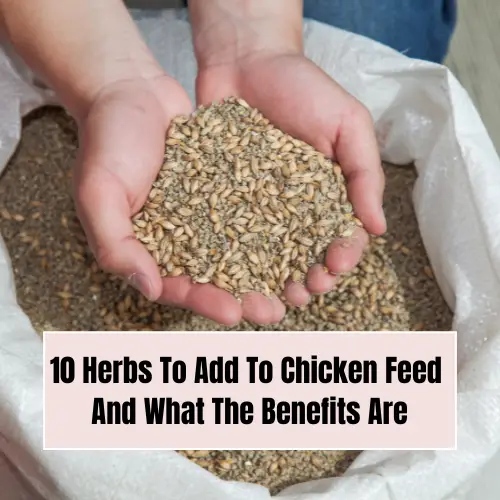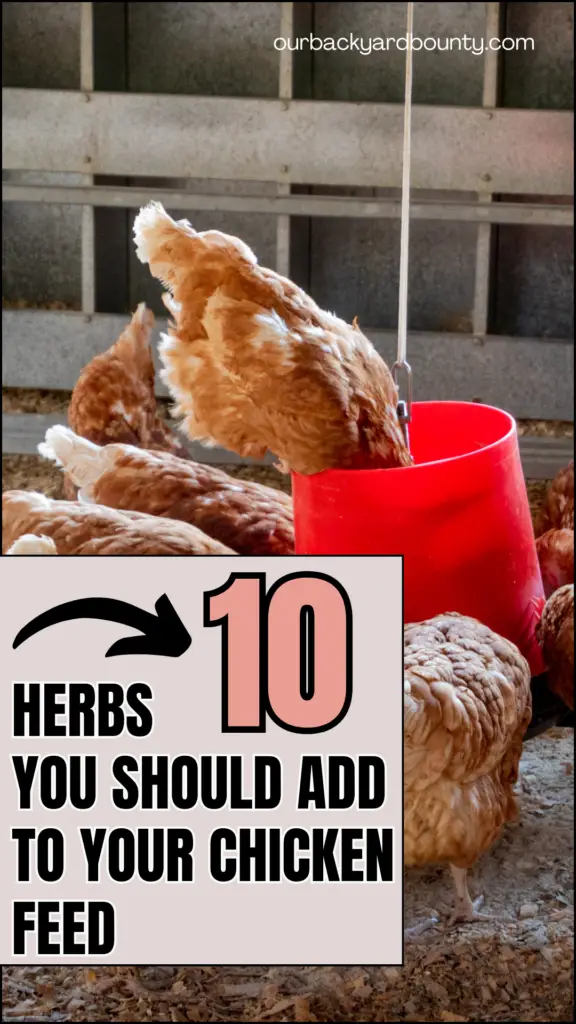This post is all about what herbs to add to chicken feed.

Best Herbs To Add To Chicken Feed To Benefit Your Chicken’s Health
Raising chickens goes beyond providing shelter and basic nutrition. As poultry enthusiasts, we strive to ensure our feathered friends are not just healthy but thriving. One often-overlooked aspect of poultry care is the role of herbs in their diet. From boosting immune systems to enhancing the flavor of eggs and meat, herbs can play a significant role in promoting the well-being of your chickens.
As a means for providing for my family, I may earn commissions if you shop through the links on this page at no additional cost to you. Thank you!
Join us as we explore the diverse array of herbs that can be added to chicken feed, uncovering their nutritional benefits and practical applications in maintaining a happy and healthy flock. Whether you’re a seasoned chicken keeper or just starting out, harnessing the power of herbs could be the key to elevating your poultry-raising experience to new heights.
- Immune System Boost – Made with a blend of organic, antioxidant-rich herbs, this feed helps boost immunity, supports overall health, and strengthens resilience against common illnesses, keeping your birds vibrant and thriving.
- Supports Digestive Health – Contains a blend digestive-supporting herbs, this feed promotes smoother digestion, helping birds absorb essential nutrients more efficiently for stronger growth, vitality, and overall well-being.
- Enhances Egg Quality – Enriched with calendula, a natural ingredient known to intensify yolk color, this feed helps produce beautiful, golden yolks for visually appealing, eggs that stand out.
- Easy to Use – Designed for easy application: sprinkle it over feed or mix it into water for flexible feeding options. Suitable for birds of all ages and breeds, supporting daily nutrition and wellness without extra hassle.
- Eco-Friendly Packaging – Comes in recyclable and compostable packaging, making it a simple, sustainable choice for your flock and the planet. Enjoy quality feed while reducing waste and supporting eco-friendly farming practices.
Red Pepper Flakes
Red pepper flakes can also be beneficial when added to chicken feed, albeit in smaller quantities due to their spiciness. Here are some potential benefits of incorporating red pepper flakes:
- Digestive Health: Capsaicin, the active compound in red pepper flakes, has been shown to stimulate the digestive system and increase nutrient absorption in animals, including chickens. This can potentially lead to better overall digestion and nutrient utilization.
- Natural Antibacterial Properties: Red pepper flakes have antimicrobial properties that may help in reducing the growth of harmful bacteria in the chicken’s digestive tract. This can contribute to gut health and reduce the incidence of gastrointestinal issues.
- Anti-parasitic Effects: Some studies suggest that capsaicin can have anti-parasitic effects, potentially helping to control internal parasites in chickens.
- Enhanced Blood Circulation: Capsaicin can promote blood circulation in chickens, which may contribute to better overall health and egg production.
When adding red pepper flakes to chicken feed, it’s important to start with small amounts and gradually increase as needed. Too much spiciness can stress chickens or deter them from eating. A recommended starting point could be about 1-2% of the total feed mixture. Mix the red pepper flakes thoroughly with the feed to ensure even distribution. Observing the chickens’ response is crucial; if they show signs of discomfort or reduced feed intake, it may be necessary to reduce the amount added.
Overall, red pepper flakes can be a natural and beneficial addition to chicken feed, providing potential health benefits alongside the nutritional and flavor enhancements offered by other herbs and supplements.
- PREMIUM QUALITY: Our red peppers are sourced from the finest peppers, ensuring a rich, authentic flavor. We select only the best peppers, carefully dried and ground to perfection. It’s free from additives or preservatives for a natural spice experience
Oregano
Adding oregano to chicken feed offers several potential benefits for the health and well-being of your flock:
- Antimicrobial Properties: Oregano contains compounds such as carvacrol and thymol, which have strong antimicrobial properties. These compounds can help inhibit the growth of harmful bacteria and fungi in the digestive tract of chickens. By maintaining a healthier gut microbiota, oregano may contribute to overall better digestive health and reduced incidence of gastrointestinal disorders.
- Immune System Support: The antioxidants and essential oils present in oregano can help boost the immune system of chickens. A stronger immune system means chickens are better equipped to fight off infections and diseases, leading to overall improved health and productivity.
- Natural Growth Promoter: Oregano has been studied for its potential as a natural growth promoter in poultry. It is believed that the antimicrobial effects of oregano can improve nutrient absorption and utilization, leading to better growth rates and feed efficiency in chickens.
- Improved Egg Quality: Incorporating oregano into the diet of laying hens may result in eggs with improved quality. This can include stronger eggshells due to better calcium utilization, as well as potentially enhancing the flavor and nutritional content of the eggs.
- Reduced Need for Antibiotics: Due to its antimicrobial properties, oregano may help reduce the need for antibiotics in chicken farming. This is particularly important as antibiotic resistance becomes a growing concern in poultry production.
- Natural Stress Reliever: Oregano is known for its calming effects, which can help reduce stress in chickens. Less stressed chickens are generally healthier and more productive.
In summary, adding oregano to chicken feed can provide a natural way to enhance health, support growth, and improve the overall well-being of your flock. It’s a beneficial herb that not only adds flavor to eggs and meat but also contributes to sustainable and holistic poultry management practices.
- PREMIUM quality natural Oregano Whole 1LB Jar, great value.
Thyme
Adding thyme to chicken feed can offer several benefits for the health and productivity of your flock:
- Antimicrobial Properties: Thyme contains compounds like thymol and carvacrol, which have strong antimicrobial and antifungal properties. These properties can help inhibit the growth of harmful bacteria and fungi in the digestive tract of chickens, promoting gut health and reducing the risk of digestive disorders.
- Antioxidant Benefits: Thyme is rich in antioxidants, including flavonoids, phenolic acids, and vitamins such as vitamin C. These antioxidants help neutralize free radicals in the body, reducing oxidative stress and supporting overall health.
- Respiratory Health: The aromatic oils in thyme, particularly thymol, have expectorant and antispasmodic properties that can support respiratory health in chickens. This is particularly beneficial during times of stress or exposure to respiratory pathogens.
- Digestive Aid: Thyme can aid digestion by stimulating the production of digestive enzymes. This can improve nutrient absorption and utilization, leading to better overall health and potentially enhanced growth rates in chickens.
- Natural Parasite Control: Some studies suggest that thyme may have anti-parasitic properties, helping to control internal parasites in chickens. This can contribute to better intestinal health and reduced reliance on chemical de-wormers.
- Flavor Enhancement: Adding thyme to chicken feed can impart a pleasant flavor to eggs and meat produced by the chickens. This can be appealing to consumers and may contribute to higher-quality poultry products.
Incorporating thyme into the diet of your chickens, either fresh or dried, can provide a natural way to support their health and well-being. It complements other herbs and supplements commonly added to chicken feed, offering a holistic approach to poultry nutrition and management. As with any dietary addition, it’s important to introduce thyme gradually and observe your flock’s response to ensure they benefit without any adverse effects.
- Birch & Meadow Thyme Leaves
Parsley
Adding parsley to chicken feed can provide several benefits for the health and productivity of your flock:
- Rich in Nutrients: Parsley is high in vitamins and minerals, including vitamin C, vitamin K, vitamin A, folate, iron, and calcium. These nutrients are essential for overall health, immune function, and egg production in chickens.
- Stronger Eggshells: The calcium content in parsley can contribute to stronger eggshells, reducing the likelihood of egg breakage and improving egg quality.
- Supports Bone Health: Calcium and vitamin K in parsley are important for bone health and strength in chickens, contributing to skeletal development and overall bone integrity.
- Antioxidant Properties: Parsley is rich in antioxidants, such as flavonoids and carotenoids, which help protect cells from damage caused by free radicals. This can support immune function and overall health in chickens.
- Digestive Aid: Parsley contains fiber and enzymes that can aid digestion and promote gut health in chickens. This may contribute to better nutrient absorption and overall digestive efficiency.
- Natural Freshener: The aromatic oils in parsley can act as a natural breath freshener for chickens, potentially reducing odors in the coop.
- Flavor Enhancement: Adding parsley to chicken feed can enhance the flavor of eggs and meat produced by the chickens, making them more palatable and appealing.
Incorporating parsley into your chickens’ diet, whether fresh or dried, can provide a natural source of essential nutrients and antioxidants. It complements other herbs and feed supplements, offering a well-rounded approach to supporting the health and well-being of your flock. As with any dietary addition, introduce parsley gradually and monitor your chickens’ response to ensure they benefit without any adverse effects.
- ROBUST FLAVOR: Dependable Food Parsley Flakes deliver a burst of robust parsley flavor to elevate your dishes; a sprinkle or spoonful is all you need for that unmistakable taste.
Sage
Adding sage to chicken feed can offer several benefits for the health and well-being of your flock:
- Antimicrobial Properties: Sage contains compounds like rosmarinic acid and essential oils (thujone, camphor, cineole) that have antimicrobial and antifungal properties. These properties can help inhibit the growth of harmful bacteria and fungi in the digestive tract of chickens, promoting gut health and reducing the risk of digestive disorders.
- Anti-inflammatory Effects: Sage has anti-inflammatory properties that can help reduce inflammation in the digestive system and other parts of the body. This can contribute to overall better health and reduced stress in chickens.
- Calming and Stress-Relieving: Sage is known for its calming effects, which can help reduce stress and anxiety in chickens. A calmer flock is generally healthier and more productive.
- Digestive Aid: The aromatic oils in sage can stimulate appetite and aid digestion in chickens. This can improve nutrient absorption and utilization, leading to better growth rates and overall health.
- Respiratory Health: Sage has expectorant properties that can support respiratory health in chickens, helping to clear mucus and improve breathing.
- Natural Insect Repellent: Sage has been traditionally used as a natural insect repellent. Adding sage to chicken feed may help repel insects in the coop, reducing the risk of infestations and potential diseases transmitted by pests.
- Flavor Enhancement: Sage can impart a pleasant flavor to eggs and meat produced by the chickens, making them more appealing to consumers.
Incorporating sage into the diet of your chickens, either fresh or dried, can provide a natural way to support their health and productivity. It complements other herbs and supplements commonly added to chicken feed, offering a holistic approach to poultry nutrition and management. As with any dietary addition, introduce sage gradually and observe your flock’s response to ensure they benefit without any adverse effects.
- Culinary Ground Sage Provides An Earthy, Slightly Peppery Taste With Notes Of Lemon, Mint And Eucalyptus In A Convenient Ground Format To Enhance The Visual Appeal And Flavor Of Dishes
Basil
Adding basil to chicken feed can offer several benefits for the health and productivity of your flock:
- Antioxidant Properties: Basil is rich in antioxidants such as flavonoids and polyphenols, including lutein and zeaxanthin. These compounds help neutralize free radicals in the body, reducing oxidative stress and supporting overall health in chickens.
- Anti-inflammatory Effects: Basil contains essential oils like eugenol, which have anti-inflammatory properties. This can help reduce inflammation in the digestive tract and other tissues, promoting better digestive health and overall well-being.
- Antimicrobial and Antifungal Benefits: The essential oils in basil, including eugenol and citronellol, have antimicrobial and antifungal properties. These properties can help inhibit the growth of harmful bacteria and fungi in the digestive system of chickens, supporting gut health and reducing the risk of digestive disorders.
- Improved Digestion: Basil can stimulate appetite and aid digestion in chickens. It helps in the secretion of digestive enzymes and supports gastrointestinal motility, which can enhance nutrient absorption and utilization.
- Immune System Support: The vitamins and minerals in basil, such as vitamin C and iron, contribute to a stronger immune system in chickens. This helps them better resist infections and diseases, leading to overall improved health.
- Stress Reduction: Basil is known for its calming effects, which can help reduce stress and anxiety in chickens. Calmer chickens are generally healthier and more productive.
- Enhanced Flavor: Adding basil to chicken feed can impart a pleasant aroma and flavor to eggs and meat produced by the chickens, making them more flavorful and appealing.
Incorporating basil into your chickens’ diet, whether fresh or dried, can provide a natural source of essential nutrients, antioxidants, and bioactive compounds. It complements other herbs and supplements commonly added to chicken feed, offering a holistic approach to supporting the health and well-being of your flock. As with any dietary addition, introduce basil gradually and monitor your chickens’ response to ensure they benefit without any adverse effects.
- ROBUST FLAVOR: Dependable Food Basil Leaves bring a robust and unmistakable flavor to your dishes; just a sprinkle or spoonful adds a burst of aromatic and slightly sweet basil seasoning.

Rosemary
Adding rosemary to chicken feed can provide several benefits for the health and productivity of your flock:
- Antioxidant Properties: Rosemary is rich in antioxidants, such as rosmarinic acid and carnosic acid. These compounds help neutralize free radicals in the body, reducing oxidative stress and supporting overall health in chickens.
- Antimicrobial Benefits: Rosemary contains essential oils like cineole and camphor, which have strong antimicrobial properties. These properties can help inhibit the growth of bacteria and fungi in the digestive tract of chickens, promoting gut health and reducing the risk of digestive disorders.
- Digestive Aid: The aromatic oils in rosemary can stimulate appetite and aid digestion in chickens. This can improve nutrient absorption and utilization, leading to better growth rates and overall health.
- Anti-inflammatory Effects: Rosemary has anti-inflammatory properties that can help reduce inflammation in the digestive system and other tissues. This can contribute to better digestive health and overall well-being in chickens.
- Respiratory Support: The aromatic oils in rosemary, such as cineole, have expectorant properties that can support respiratory health in chickens. This is particularly beneficial during times of stress or respiratory challenges.
- Natural Insect Repellent: Rosemary has been traditionally used as a natural insect repellent. Adding rosemary to chicken feed may help repel insects in the coop, reducing the risk of infestations and potential diseases transmitted by pests.
- Flavor Enhancement: Rosemary can impart a pleasant flavor to eggs and meat produced by the chickens, making them more appetizing and enjoyable for consumers.
Incorporating rosemary into the diet of your chickens, either fresh or dried, can provide a natural way to support their health and well-being. It complements other herbs and supplements commonly added to chicken feed, offering a holistic approach to poultry nutrition and management. As with any dietary addition, introduce rosemary gradually and monitor your chickens’ response to ensure they benefit without any adverse effects.
- ROBUST FLAVOR: Dependable Food Rosemary Leaves add a robust and unmistakable flavor to your dishes; just a sprinkle or spoonful imparts the iconic taste of rosemary spice.
Dill
Adding dill to chicken feed can offer several benefits for the health and productivity of your flock:
- Nutrient Rich: Dill is rich in vitamins and minerals, including vitamin A, vitamin C, manganese, and iron. These nutrients are essential for overall health, immune function, and egg production in chickens.
- Digestive Aid: Dill contains volatile oils that stimulate the digestive system, promoting healthy digestion in chickens. This can improve nutrient absorption and utilization, leading to better growth rates and overall health.
- Anti-inflammatory Properties: Dill has anti-inflammatory properties that can help reduce inflammation in the digestive tract and other tissues. This can contribute to better digestive health and overall well-being in chickens.
- Antioxidant Benefits: Dill contains flavonoids like kaempferol and quercetin, which have antioxidant properties. These compounds help neutralize free radicals, reducing oxidative stress and supporting overall health.
- Natural Calming Effect: Dill is known for its calming effects, which can help reduce stress and anxiety in chickens. Calmer chickens are generally healthier and more productive.
- Respiratory Support: The aromatic oils in dill, such as carvone, have expectorant properties that can support respiratory health in chickens. This is beneficial during times of stress or respiratory challenges.
- Flavor Enhancement: Adding dill to chicken feed can impart a pleasant aroma and flavor to eggs and meat produced by the chickens, making them more flavorful and appealing.
Incorporating dill into your chickens’ diet, whether fresh or dried, can provide a natural source of essential nutrients and bioactive compounds. It complements other herbs and supplements commonly added to chicken feed, offering a holistic approach to supporting the health and well-being of your flock. As with any dietary addition, introduce dill gradually and monitor your chickens’ response to ensure they benefit without any adverse effects.
- Culinary Harmony Unleashed: Immerse your dishes in the pure herbal delight of Dependable Foods Dill Weed, meticulously sourced from premium-grade, 100% natural dill weed, and presented in a convenient 2 Lbs. jug.
Garlic
Adding garlic powder to chicken feed can provide several benefits for the health and well-being of your flock:
- Antimicrobial Properties: Garlic contains allicin, a compound known for its antimicrobial properties. Allicin can help inhibit the growth of harmful bacteria and fungi in the digestive tract of chickens, promoting gut health and reducing the risk of infections.
- Immune System Support: Garlic is rich in antioxidants, such as vitamin C and selenium, which help support a healthy immune system in chickens. A stronger immune system can help chickens resist diseases and infections more effectively.
- Natural De-wormer: Garlic is known to have anthelmintic properties, meaning it can help control internal parasites such as worms in chickens. Regular consumption of garlic may reduce the incidence of parasitic infestations in the flock.
- Improved Respiratory Health: Garlic has expectorant and antimicrobial properties that can support respiratory health in chickens. It may help clear mucus from airways and reduce the severity of respiratory infections.
- Antioxidant Benefits: Garlic contains sulfur compounds like diallyl sulfide and diallyl disulfide, which have antioxidant properties. These compounds help neutralize free radicals, reducing oxidative stress and supporting overall health.
- Improved Feed Palatability: Garlic can enhance the palatability of chicken feed, making it more appealing to chickens. This can encourage better feed consumption and nutrient intake.
- Natural Insect Repellent: The sulfur compounds in garlic may act as a natural insect repellent. Adding garlic to chicken feed may help repel external pests like flies and mosquitoes.
When adding garlic powder to chicken feed, it’s important to do so in moderation. Too much garlic can impart a strong taste to eggs and meat, which may not be desirable to consumers. Start with small amounts and gradually increase as needed while monitoring your flock’s response. Overall, garlic powder can be a beneficial addition to chicken feed, offering natural health benefits and supporting the overall well-being of your chickens.
- US-FARMERS quality natural Garlic Granulated 7 LB Jar, great value.
Ginger
Adding ginger to chicken feed can offer several benefits for the health and well-being of your flock:
- Digestive Aid: Ginger is known for its digestive properties, including stimulating appetite and aiding digestion. It can help chickens better digest their food, leading to improved nutrient absorption and utilization.
- Anti-inflammatory Effects: Ginger contains gingerols and other compounds with anti-inflammatory properties. This can help reduce inflammation in the digestive tract and other tissues, promoting better digestive health and overall well-being in chickens.
- Antioxidant Benefits: Ginger is rich in antioxidants, such as gingerol and zingerone, which help neutralize free radicals. This can reduce oxidative stress and support immune function in chickens.
- Respiratory Support: Ginger has expectorant properties that can help support respiratory health in chickens. It may assist in clearing mucus from airways and alleviating respiratory symptoms during periods of stress or respiratory challenges.
- Stress Reduction: Ginger has adaptogenic properties, meaning it can help chickens adapt to stressors more effectively. This can lead to reduced stress levels and improved overall resilience in chickens.
- Anti-parasitic Properties: Some studies suggest that ginger may have anti-parasitic effects, helping to control internal parasites in chickens. This can contribute to better intestinal health and reduced reliance on chemical de-wormers.
- Improved Blood Circulation: Ginger can improve blood circulation in chickens, which may support overall health and vitality.
- Flavor Enhancement: Adding ginger to chicken feed can impart a subtle spicy and aromatic flavor to eggs and meat produced by the chickens, enhancing their palatability.
When adding ginger to chicken feed, use it in moderation and start with small amounts. Monitor your flock’s response to ensure they tolerate it well and benefit from its effects. Ginger can be added in powdered or grated form to feed mixes or as part of herbal blends. Overall, ginger can be a valuable addition to chicken feed, providing natural health benefits and supporting the overall well-being of your chickens.
- Zesty Spice Delight: Elevate your dishes with the zesty delight of Dependable Foods Ground Ginger, meticulously sourced from premium-grade, 100% natural ginger, and presented in a generous 5 Lbs. jug.
Those are 10 of the best herbs to add to chicken feed!
15 Thoughtful Gifts For Gardeners To Grab Now
This post is all about gifts for gardeners. Best Gifts For Gardeners If you’re looking…
8 Best Companion Plants For Green Beans For Big Harvests
This post is all about companion plants for green beans. If you’re growing green beans…
The Best Companion Plants for Tomatoes (And What to Avoid)
This post is all about best companion plants for tomatoes. Best Companion Plants For Tomatoes…
10 Herbs To Plant Around Your Chicken Coop – & Why!
This post is all about what herbs to plant around your chicken coop. Best Herbs…
How To Keep Chickens Cool In The Summer Heat – 10 Game Changing Hacks
This post is all about how to keep chickens cool in the summer. Ways To…
10 Best Predator Proof Chicken Coop Essentials
This post is all about predator proof chicken coop essentials. Predator Proof Chicken Coop Essentials…
What You’ll Find Here
Are you eager to embrace the homesteading lifestyle, but worried about not having enough land? Fear not, for you don’t need vast acres to become a mini homesteader. With a little creativity and effort, you can transform your backyard into a thriving homestead, complete with chickens and a garden. Imagine the satisfaction of growing your own food and using it to whip up delicious, healthy meals. And if you’re ready to take the plunge and raise backyard chickens, you’ve come to the right place. This is where we’ll guide you through the world of modern homesteading.

Follow Us On Tik Tok and Instagram!



















